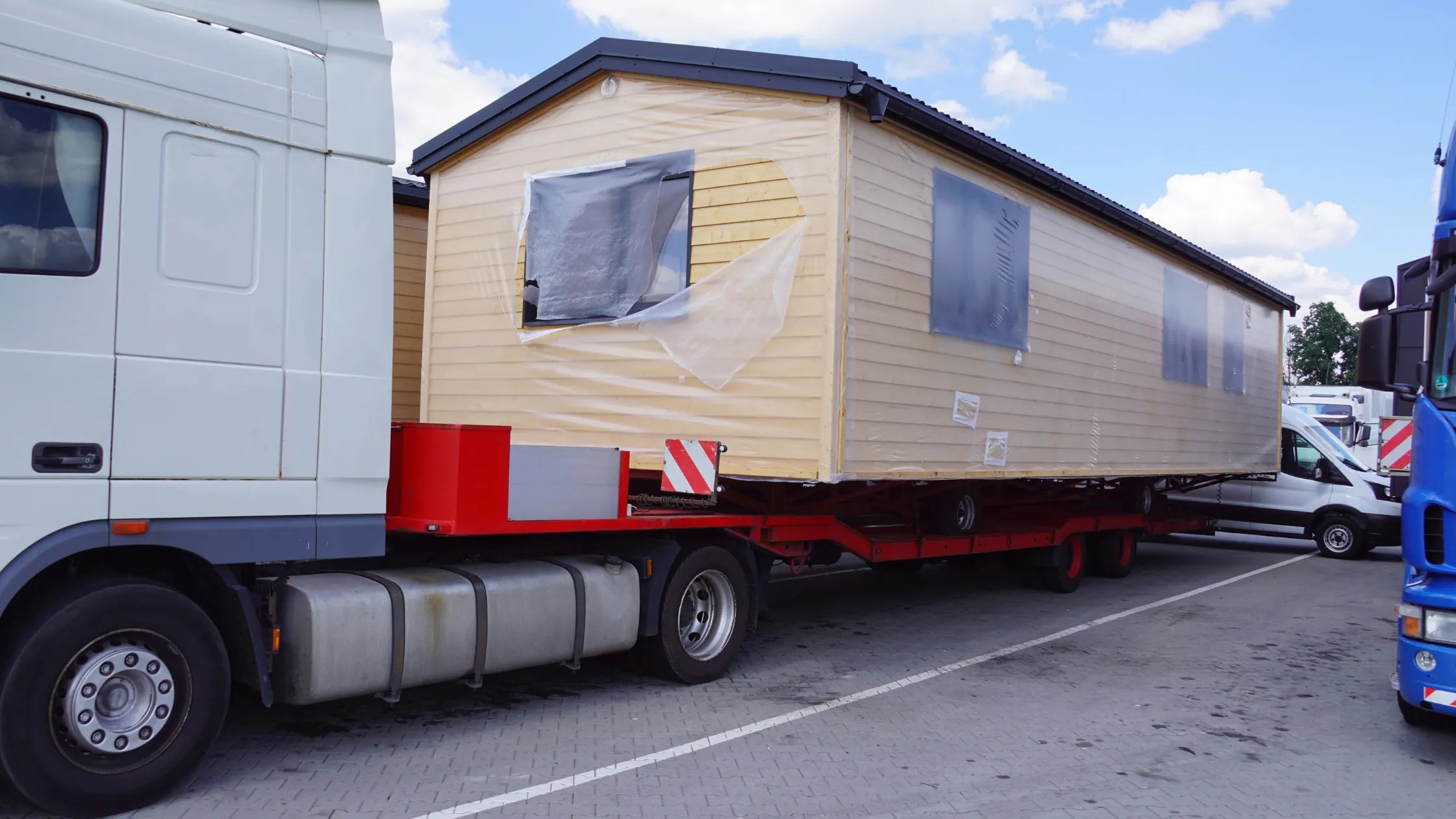The Complete Guide to Moving Your Mobile Home: DIY vs Professional Movers

Moving a mobile home (also called a manufactured home) is a complex undertaking that requires careful planning, proper permits, and specialized equipment. Whether you're relocating your single-wide mobile home or double-wide mobile home, this process involves much more than simply transporting the structure from one location to another.
Many mobile homeowners consider DIY mobile home moving to save money and maintain control over the relocation process. While this approach can be cost-effective, it's important to understand the significant responsibilities and risks involved when you move your mobile home yourself.
This comprehensive guide explores the benefits and drawbacks of moving your manufactured home yourself versus hiring professional movers, helping you make the best decision for your budget, timeline, and home safety.
Key Takeaways
- DIY manufactured home relocation can reduce costs but requires extensive planning and expertise
- Understanding the complexities involved is crucial for successful mobile home relocation
- Professional moving companies handle logistics and compliance, but at higher costs
- Moving a mobile home involves utility disconnection, permits, specialized transport, and setup services
-
Careful execution is necessary to ensure your home is structurally sound and safely relocated
"The mobile home moving market reveals a critical gap in consumer education—while DIY appears to offer 70% cost savings on paper, the hidden liability exposure from structural damage, regulatory violations, and insurance voids often exceeds the entire professional moving fee, making it one of the few relocation scenarios where the 'cheaper' option consistently costs more in the long run." – Zach Richards, CEO, Caddy Moving
Understanding Mobile Home Moving: What's Involved
Thinking of moving your manufactured home yourself? Be prepared—relocating your mobile home is a large-scale project that involves much more than hitching your home to a truck and driving away.
Essential Requirements for Mobile Home Relocation
When you move a mobile home, you'll need:
- Detailed disconnection plan for all utilities (water, gas, electricity, sewage)
- Moving permits from local authorities and potentially the Department of Motor Vehicles
- Specialized equipment, including hydraulic jacks, dollies, and heavy-duty transport vehicles
- Knowledge of regulations, including HUD building codes and local zoning laws
- Adequate timeline that gives you plenty of time for each phase of the move
The Mobile Home Moving Process: Step by Step
1. Prepare Your Mobile Home for Transport
Before you can move your home, several preparation steps are essential:
- Remove skirting and secure all loose items inside the mobile home
- Disconnect utilities, including water, gas, electricity, and sewage lines
- Work with utility companies to safely shut off services at your current location
- Ensure your mobile home is structurally sound and ready for transport
2. Obtain Necessary Permits
Most states require specific permits when you relocate your mobile home:
- Moving permit from your current state or county
- Set up a permit for installation at the new location
- Compliance verification with HUD building codes (required for homes built after 1976)
- Special considerations for homes built before 1976, which may face relocation restrictions
3. Secure Transport Equipment
Moving your manufactured home requires specialized equipment:
- Heavy-duty tractor or tow vehicle capable of handling your mobile home's size and weight
- Hydraulic jacks for lifting and positioning
- Dollies and axles for transport
- Escort vehicles if required by local regulations
4. Coordinate Route and Regulations
When you move your mobile home across county or state lines:
- Plan your route to avoid low bridges, tight turns, and restricted roads
- Coordinate with local authorities for inspections at both origin and destination
- Verify that your new mobile home park or location accepts your home type and age
Permits and Regulations for Mobile Home Moving
In the United States, regulations for moving manufactured homes vary significantly by state and locality. Before relocating your mobile home, research the specific requirements in your destination area, as some jurisdictions have strict rules about where mobile homes can be placed.
State Permit Requirements
|
State |
Moving Permit Required |
Regulating Agency |
|
California |
Yes |
CA Dept. of Housing and Community Development |
|
Texas |
Yes |
TX Dept. of Housing and Community Affairs |
|
Florida |
Yes |
FL Dept. of Business and Professional Regulation |
Important: Work with a licensed mobile home mover or consultant to ensure compliance with all local and state regulations.
Benefits of DIY Mobile Home Moving
1. Significant Cost Savings
The cost to move a mobile home using professional moving companies typically ranges from $5,000 to $15,000 or more, depending on the distance of the move, the size of your mobile home, and the services included. DIY moving can substantially reduce these expenses if you have the necessary skills and equipment.
|
Cost Category |
Professional Move |
DIY Move Estimate |
|
Labor |
$2,000 - $5,000 |
$0 (your own time) |
|
Equipment Rental |
Included |
$500 - $1,500 |
|
Permits & Inspections |
$500 - $2,000 |
$500 - $2,000 |
|
Total Estimated Cost |
$5,000 - $15,000+ |
$1,000 - $3,500 |
Note: Always factor in insurance, fuel costs, and setup services at your new location when calculating the total cost of moving your mobile home.
2. Complete Control Over Timeline
By handling the relocation yourself, you choose your schedule. This flexibility helps if you're coordinating with a manufactured home park, waiting on a lot rental agreement, or managing multiple moves.
3. Personal Oversight and Care
Hiring professional movers may create anxiety about potential damage to your home. DIY mobile home moving allows you to personally monitor each step, ensuring careful handling of your home and belongings throughout the relocation process.
Challenges and Risks of DIY Mobile Home Moving
While cost savings are appealing, moving your mobile home yourself involves serious risks and challenges that every homeowner should carefully consider.
1. Requires Specialized Equipment and Expertise
Successfully relocating your manufactured home requires much more than a standard tow vehicle. Professional mobile home movers use specialized equipment, including
- Hydraulic jacks for safe lifting and positioning
- Transport axles and tires rated for your home's weight
- Dollies and alignment equipment for precise positioning
- Certified drivers and potentially pilot or escort vehicles
Improper use of this equipment can lead to structural damage, serious accidents, or voiding of your homeowner's insurance policy.
2. Complex Utility Disconnection and Reconnection
Each utility system requires careful handling by qualified professionals:
|
Utility |
Pre-Move Requirements |
Post-Move Requirements |
|
Electricity |
Professional disconnection and wire capping |
Licensed reconnection, testing, and inspection |
|
Water |
Proper shutoff and pipe disconnection |
Reconnection, system flushing, and pressure testing |
|
Gas |
Safe disconnection by licensed technician |
Licensed reconnection and mandatory pressure testing |
3. Legal and Safety Hazards
Several serious risks accompany DIY mobile home moving:
- Regulatory compliance: Homes built before 1976 may not meet current HUD standards and cannot be moved to many mobile home parks or municipalities
- Safety risks: Accidents during transport can cause serious injuries or major property damage
- Legal consequences: Failing to follow building codes or obtain proper permits can result in fines, delays, or denial of occupancy at your new location
Should You Choose DIY or Professional Mobile Home Movers?
Relocating your mobile home yourself is technically possible, but it's not the right choice for every homeowner. Consider DIY moving only if you're comfortable navigating complex permit processes, coordinating with utility companies, and handling specialized moving equipment.
When Professional Moving Companies Are Worth the Investment
For most mobile homeowners, hiring professional movers ensures legal compliance, safety, and peace of mind. Reputable moving companies typically offer:
- Transport-only moves for budget-conscious customers
- Full-service moves including disconnect and setup services
- Permit assistance and regulatory compliance support
- Insurance coverage in case of damage during transport
Making Your Decision: Key Factors to Consider
Before choosing between DIY and professional mobile home moving, evaluate:
- Cost analysis: Compare the total cost of moving (including hidden expenses) versus the value of your time and risk tolerance
- Regulatory knowledge: Assess your familiarity with local and state regulations for mobile home relocation
- Equipment access: Determine your ability to secure proper equipment and experienced help
- Timeline flexibility: Consider whether you have plenty of time to handle potential delays and complications
Frequently Asked Questions About Mobile Home Moving
What are the first steps I should take when planning to move my mobile home?
Start by checking local laws and getting the right permits. You'll also need to turn off utilities and get your home ready for the move.
How much does it cost to move a mobile home?
The cost to move a mobile home varies significantly based on several factors, including the size of your home, the distance of the move, and the services required. Professional moves typically cost $5,000-$15,000, while DIY moves may cost $1,000-$3,500 when factoring in permits, equipment rental, and labor.
Can I move my mobile home myself, or should I hire professional movers?
While DIY mobile home moving is possible, it requires specialized knowledge, equipment, and a significant time investment. Professional moving companies provide expertise, proper equipment, and insurance coverage, making them the safer choice for most homeowners.
What kind of permits do I need to move my manufactured home?
Permits for moving a manufactured home vary by area. You'll usually need a local permit. You might also have to follow building codes and zoning rules.
How do I prepare my mobile home for transport?
Preparation involves securing all loose items inside the mobile home, disconnecting utilities, removing skirting, and ensuring your home is structurally sound. You may also need to remove additions like porches or decks that weren't part of the original structure.
What are the risks of DIY mobile home moving?
DIY moving risks include structural damage to your home, personal injury, legal liability, and potential violations of local building codes or regulations. Improper handling can also void insurance coverage and create safety hazards.
How do I ensure my mobile home is properly secured during transport?
Proper securing requires manufacturer-specified tie-downs, chains, and straps applied according to professional standards. The transportation method must be appropriate for your home's size, weight, and structural design.
What should I consider when choosing a new location for my mobile home?
Consider local zoning laws, utility availability, soil conditions, and whether your home meets the destination's age and condition requirements. Verify that mobile home parks or municipalities accept your specific type and age of manufactured home.
How long does it take to move a mobile home?
Moving timeframes vary based on distance, complexity, and permit processing times. Plan for several weeks to months for the complete process, including preparation, transport, and setup at your new location.
Ready to Move Your Mobile Home?
Let Caddy Moving Help
Whether you're considering a DIY approach or leaning toward hiring professionals, moving a mobile or manufactured home is no small task. From permits and planning to logistics and labor, every detail counts.
Caddy Moving is here to make the process smoother, safer, and more affordable. Our experienced team can help you move your manufactured home correctly and efficiently—so you can focus on settling into your new space.
Get in touch with a trusted mobile home mover today:
Contact Caddy Moving for a free quote or to speak with a relocation specialist.
Relocate with confidence. Move with Caddy.
